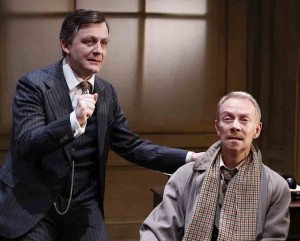In 1992, when Stephen Daldry revived J.B. Priestley’s warhorse An Inspector Calls, the British playwright was largely forgotten. Daldry’s inventive staging was a runaway triumph in London and New York, but only sporadically were Priestley's other plays revived here: Dangerous Corner at the Atlantic, The Glass Cage at the Mint. However, they added to the suspicion that Priestley’s obscurity was unfair. Now the Finborough Theatre, arriving from London with Cornelius for the Brits Off-Broadway festival, provides the most damning evidence yet.
Priestley’s play is about many things: a society in change, the callousness of the business world, and the way that work defines people. James Cornelius, a partner in Briggs & Murrison, an aluminum importer, is awaiting the return of Murrison, who has been scouring the country for orders. Meanwhile, the firm’s finances are shaky; creditors are beating at the door, and the staff is awkwardly trying to avoid them in the street or give them assurances of imminent payment that they know to be uncertain.
Over two turbulent weeks, as the firm totters and falls, Priestley examines the victims, their past hopes, and their probable futures. They include Miss Porrin (Pandora Colin), a middle-aged spinster whose commitment to the business hinges on her secret love for Cornelius; Biddle (Col Farrell), an elderly and kindly loyalist who doesn’t care to retire yet; and Lawrence (David Ellis), a frustrated office boy.
Beset by the creditors and flummoxed by various attitudes of the staff, Cornelius has a further problem when Judy Evison (Emily Barber), a lovely young woman, arrives to fill in for her sister, who is a secretary at the firm but has been called away to care for an ailing husband. The outspoken Judy, played by Emily Barber with pluck and confidence, is also a competent, unemployed secretary, and Cornelius reluctantly allows her to fill in.
Cornelius bears surprising parallels to current events, not just in the fallout of the company’s collapse, which is engendered by falling prices and export barriers that sound familiar to the modern ear, but in other ways. A former airman (Andrew Fallaize, in a poignant cameo of a man struggling to keep his honor in desperate straits) arrives to sell business supplies, but he almost faints. Trying to establish himself in the civilian world, the ex-officer is starving and falling through society’s cracks. Cornelius’s advice—“Think of some way to make money”—is absurdly futile. “I’m not allowed to earn a living in any of the old ways,” laments the flier.
Priestley’s details create a mosaic of a world in flux. A stream of door-to-door salespeople arrive, but when a young woman enters, selling shaving products, the male workers are astonished. In one of many comical moments, Miss Porrin flies off the handle, labeling such saleswomen “vulgar, shameless sirens.” When Lawrence complains of being 19 and still at a boy’s job, Cornelius asks, “What do you want to do?” Lawrence answers, “Something to do with wireless and gramophones. I’m really interested in them.” And Cornelius responds, “So is everybody else of your age…. Wireless and gramophones and motor-cars and aeroplanes.… And how everybody’s going to make a living out of that beats me.”
As Cornelius scorns those future staples of modern technology, you may find the words “smartphones,” “tablets” and “apps” leaping to mind. Everything, new and old, can be turned into a business transaction: the aged Biddle is collecting estimates for his eventual cremation. As the demise of Briggs & Murrison approaches, Cornelius begins to question whether he has any future. Clearly he has always taken his lead from Murrison, but the arrival of a changed Murrison undermines all their hopes.
Director Sam Yates has drawn sterling performances from 11 of the dozen cast members, and the bar is set high from the moment Beverley Klein’s hearty cockney charwoman enters. Klein reappears later as the landlord’s niece, unrecognizable in her change; she and others, like Fallaize, vividly take on multiple roles.
Unfortunately, Alan Cox in the title role is problematic. From moments after his first entrance, Cox plays to the audience in a noticeable way. If he turns, he lingers full front just long enough to acknowledge the viewers; late in the play, when he toasts Judy’s happiness with a flask, he turns from her to hold the flask up full front to the audience. It’s a habit that’s irritating and tiresome and distracts from the story; Yates should have curbed it, because Cox is just fine when he’s fully focused on his fellow actors.
Still, Priestley’s astonishing play shines through, and the wide net Cornelius casts in its look at British society—there are romantic subplots as well—is a sad reminder that few dramatists nowadays, except Tony Kushner, offer such breadth in a single work.



